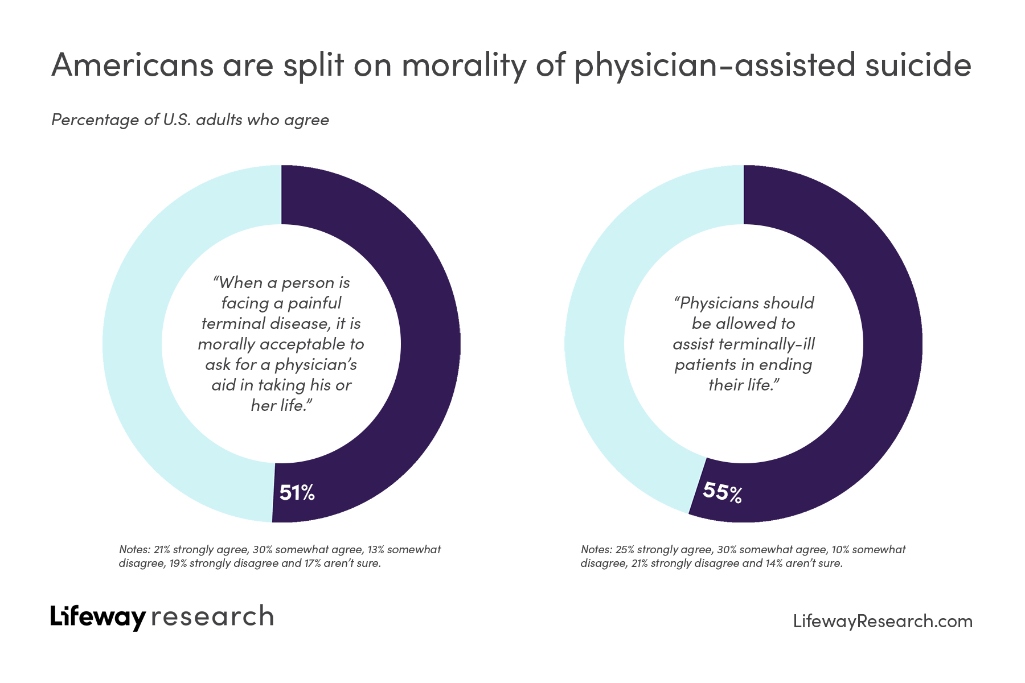
BRENTWOOD, Tenn. — Half of Americans believe a terminally ill person should be able to ask a doctor for help in ending their life. Legal approval has outpaced the growth in public support.
A Lifeway Research study of U.S. adults finds 51% think it is morally acceptable for a person facing a painful terminal disease to ask for a physician’s aid in taking his or her life.
“Half of Americans seek their own comfort and their own way even in their death, but that doesn’t mean they don’t think twice about the morality of physician-assisted suicide,” said Scott McConnell, executive director of Lifeway Research. “Only 1 in 5 Americans strongly agree such a decision is morally acceptable; others are less sure.”

Assisted suicide support
Oregon passed the first “Death with Dignity” law allowing physician-assisted suicide in 1997. Currently, the practice is legal in 12 U.S. jurisdictions: California, Colorado, Delaware, the District of Columbia, Hawaii, Montana, Maine, New Jersey, New Mexico, Oregon, Vermont and Washington.
While 51% of Americans agree with the morality of physician-assisted suicide, just 21% strongly agree. Another third (32%) disagree, and 17% aren’t sure, according to Lifeway Research.
In a 2016 Lifeway Research study, 67% said the practice was morally acceptable, while 33% disagreed. In that previous survey, however, respondents were not given the option of saying they weren’t sure.
Additionally, 77% of Americans said they believed suicide was an epidemic in a 2021 Lifeway Research study. Few, however, felt comfortable making moral or eternal judgments about those who took their own lives. Just 38% said those who die by suicide are selfish, and 23% said they believe those who do so automatically go to hell.
“Americans base their criteria for morality on different things. Those who see the Bible’s teaching as having authority in their lives are the least likely to say physician-assisted suicide is morally acceptable,” McConnell said. “They take seriously that God breathes life and holds the keys to death.”
The latest Gallup study finds that a similar 53% of Americans believe doctor-assisted suicide is morally acceptable, while 40% believe it is morally wrong. Support for the practice in Gallup’s annual study has remained near 50% since it began asking about the practice in 2001.
In the most recent Lifeway Research study, the youngest and oldest Americans are among the most likely to support physician-assisted suicide. Those 18-34 (56%) and 65 or older (54%) are more likely than those 50-64 (45%) to see the practice as morally acceptable. Men are also more likely to agree than women (54% v. 49%).
U.S. adults in the West are more likely than those in the South to support it (57% v. 49%). This reflects the legal realities of the two regions. Half of the states where physician-assisted suicide is legal are in the West, while none are in the South.
Religious beliefs and practices also contribute to the likelihood that a person backs the practice. The religiously unaffiliated (63%) and Catholics (59%) are more likely to be supportive than Protestants (42%) or those from non-Christian religions (42%). Additionally, Americans who strongly agree with four key evangelical theological beliefs are less likely than those without such beliefs to back physician-assisted suicide (40% v. 55%).
Church attendance impacts the likelihood that someone will support the practice, but not in a predictable way. Those on the two extremes — adults who attend more than once a week (58%) and adults who rarely or never attend (58%) — are more likely than those who attend about once a week (40%) and those who attend once or twice a month or only on religious holidays (44%) to say they believe physician-assisted suicide is morally acceptable.
Physician defense
Most Americans (55%) believe physicians should be able to assist terminally ill patients in ending their lives, including a quarter (25%) who strongly agree. Around 3 in 10 (31%) disagree, and 14% aren’t sure.
“Physician-assisted suicide has at least two parties facing a moral question — the one taking their own life and the physician who helps. Barely a majority of Americans say it is morally acceptable to take your own life, with slightly more saying a doctor can help,” said McConnell.
Again, men are more likely than women to agree (58% v. 52%) and those in the West are more likely than residents of the South (58% v. 51%).
The religiously unaffiliated (65%) and Catholics (61%) are also more likely than Protestants (49%) and those from non-Christian religions (43%) to think physicians should be able to assist with the suicide of terminally ill patients.
Americans with evangelical beliefs are less likely than those without those beliefs to back physicians assisting with suicides (39% v. 60%).
Less time at religious services often means more support for physicians’ ability to participate. Those who rarely or never attend religious services (60%) and those who attend once or twice a month or only on religious holidays (55%) are more likely than those who attend about once a week (45%) to agree. Additionally, those who rarely or never attend are the least likely to disagree (22%).
For more information, view the complete report and visit LifewayResearch.com.
Methodology
The online survey of 1,200 Americans was conducted Aug. 14-30, 2024, using a national prerecruited panel. Quotas and slight weights were used to balance gender, age, region, ethnicity, education, religion and evangelical beliefs to reflect the population more accurately. The sample includes an over-sample of Americans with evangelical beliefs, providing additional reliability for breakouts of this group. Totals for all Americans reduce these responses to their correct proportion through weighting. The completed sample is 1,200 surveys. The sample provides 95% confidence that the sampling error from the panel does not exceed plus or minus 3.3%. This margin of error accounts for the effect of weighting. Margins of error are higher in subgroups.
Christians are those with a religious preference of Catholic, Protestant, nondenominational Christian or Orthodox. Evangelical beliefs are defined using the National Association of Evangelicals and Lifeway Research’s evangelical beliefs research definition based on respondents’ beliefs. Respondents are asked their level of agreement with four separate statements using a four-point, forced-choice scale (strongly agree, somewhat agree, somewhat disagree, strongly disagree). Those who strongly agree with all four statements are categorized as having evangelical beliefs:
- The Bible is the highest authority for what I believe.
- It is very important for me personally to encourage non-Christians to trust Jesus Christ as their Savior.
- Jesus Christ’s death on the cross is the only sacrifice that could remove the penalty of my sin.
- Only those who trust in Jesus Christ alone as their Savior receive God’s free gift of eternal salvation.
(EDITOR’S NOTE — Aaron Earls is a writer for LifeWay Christian Resources.)


